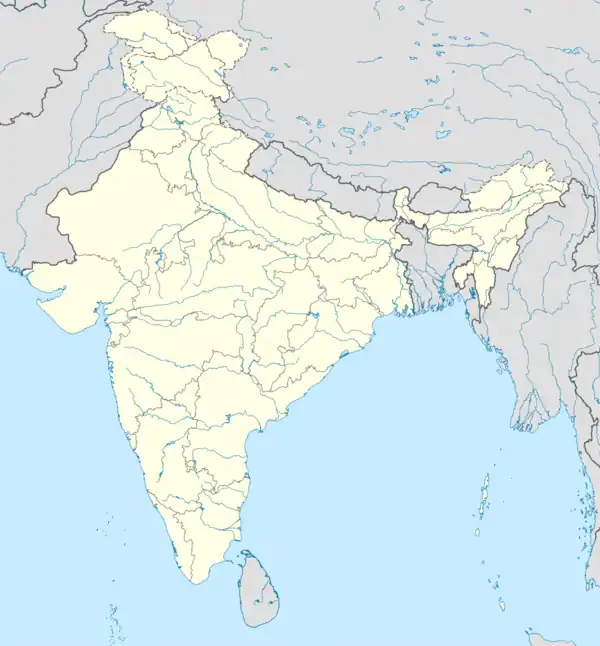Arra | |
|---|---|
Census Town | |
 Arra Location in West Bengal, India  Arra Arra (India) | |
| Coordinates: 23°30′23″N 86°41′37″E / 23.50645°N 86.69361°E | |
| Country | |
| State | West Bengal |
| District | Puruliya |
| Area | |
| • Total | 8.64 km2 (3.34 sq mi) |
| Population (2011) | |
| • Total | 21,272 |
| • Density | 2,500/km2 (6,400/sq mi) |
| Languages | |
| • Official | Bengali, English |
| Time zone | UTC+5:30 (IST) |
| PIN | 723121 |
| Telephone/STD code | 03251 |
| ISO 3166 code | IN-WB |
| Vehicle registration | WB |
| Website | purulia |
Arra is a census town in the Raghunathpur I CD block in the Raghunathpur subdivision of the Puruliya district in the state of West Bengal, India.
Geography
M: municipal town, CT: census town, R: rural/ urban centre, H: historical/ religious centre, T: tourist centre
Owing to space constraints in the small map, the actual locations in a larger map may vary slightly
Location
Aara is located at 23°30′16″N 86°41′47″E / 23.5045°N 86.6963°E.
Area overview
Purulia district forms the lowest step of the Chota Nagpur Plateau. The general scenario is undulating land with scattered hills.[1] Raghunathpur subdivision occupies the northern part of the district. 83.80% of the population of the subdivision lives in rural areas. However, there are pockets of urbanization and 16.20% of the population lives in urban areas. There are 14 census towns in the subdivision.[2] It is presented in the map given alongside. There is a coal mining area around Parbelia[3] and two thermal power plants are there – the 500 MW Santaldih Thermal Power Station[4] and the 1200 MW Raghunathpur Thermal Power Station. The subdivision has a rich heritage of old temples, some of them belonging to the 11th century or earlier. The Banda Deul is a monument of national importance.[5][6] The comparatively more recent in historical terms, Panchkot Raj has interesting and intriguing remains in the area.[7][8]
Note: The map alongside presents some of the notable locations in the subdivision. All places marked in the map are linked in the larger full screen map.
Demographics
According to the 2011 Census of India, Arra had a total population of 21,272, of which 11,135 (52%) were males and 10,137 (48%) were females. There were 2,063 persons in the age range of 0–6 years. The total number of literate persons in Arra was 15,604 (81.23% of the population over 6 years).[9]
As of 2001 India census,[10] Arra had a population of 19,911. Males constitute 52% of the population and females 48%. Arra has an average literacy rate of 66%, higher than the national average of 59.5%; with 59% of the males and 41% of females literate. 12% of the population is under 6 years of age.
Infrastructure
According to the District Census Handbook 2011, Puruliya, Arra covered an area of 8.64 km2. There is a railway station at Adra, 1 km away. Among the civic amenities, the protected water supply involved uncovered well, tube-well, bore-well. It had 1,665 domestic electric connections. Among the medical facilities it had 1 dispensary/ health centre. Among the educational facilities it had were 8 primary schools, 3 middle schools, the nearest secondary school, the nearest senior secondary school at Adra 1 km away, the nearest general degree college at Raghunathpur 8 km away. It had 2 special schools for disabled. Three important commodities it produced were paddy, clay pots and bamboo products.[11]
Education
Barabagan Junior High School is a Bengali-medium coeducational institution established in 2009. It has facilities for teaching from class V to class VIII.[12]
References
- ↑ Houlton, Sir John, Bihar, the Heart of India, 1949, p. 170, Orient Longmans Ltd.
- ↑ "District Statistical Handbook 2014 Purulia". Tables 2.1, 2.2. Department of Planning and Statistics, Government of West Bengal. Archived from the original on 21 January 2019. Retrieved 12 January 2020.
- ↑ "Area wise Closed User Group (CUG) Telephone Numbers" (PDF). Sodepur Area. Eastern Coalfields Limited. Retrieved 11 August 2018.
- ↑ "Santaldih Thermal Power Station - WBPDCL". WBPDCL. Archived from the original on 11 January 2010. Retrieved 24 August 2011.
- ↑ "Old temple at Banda (locally known as deul)". ASI, Kolkata Circle. Retrieved 23 January 2020.
- ↑ "List of Ancient Monuments and Archaeological Sites and Remains of West Bengal - Archaeological Survey of India". Item no. 134. ASI. Retrieved 25 January 2020.
- ↑ "Capital in shambles: Garh Panchakot, Purulia". Heritage in Peril. Archived from the original on 1 December 2016. Retrieved 1 December 2016.
- ↑ "Historical ruins". Trek Earth. Retrieved 1 December 2016.
- ↑ "CD block Wise Primary Census Abstract Data(PCA)". West Bengal – District-wise CD Blocks. Registrar General and Census Commissioner, India. Retrieved 3 February 2020.
- ↑ "Census of India 2001: Data from the 2001 Census, including cities, villages and towns (Provisional)". Census Commission of India. Archived from the original on 16 June 2004. Retrieved 1 November 2008.
- ↑ "District Census Handbook Puruliya, Census of India 2011, Series 20, Part XII A" (PDF). Section II Town Directory, Pages 1073-1083 Statement I: Status and Growth History, Pages 1006-1010; Statement II: Physical Aspects and Location of Towns, Pages 1010-1015; Statement III: Civic and other Amenities, Pages 1015-1019; Statement IV: Medical Facilities 2009, Pages 1019-1027 Statement V: Educational, Recreational and Cultural Facilities, Pages 1027- 1029: Statement VI:Industry and Banking. Directorate of Census Operations V, West Bengal. Retrieved 30 January 2020.
- ↑ "Barabagan Junior High School". Kulguru. Retrieved 3 February 2020.
